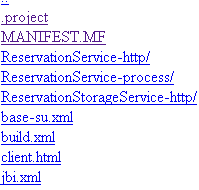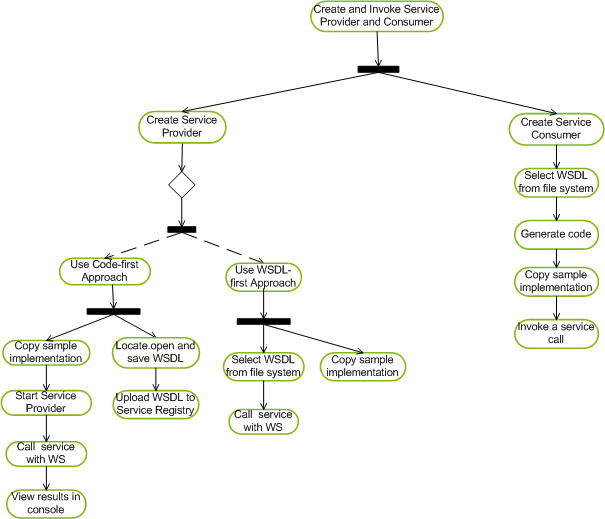Notice: this Wiki will be going read only early in 2024 and edits will no longer be possible. Please see: https://gitlab.eclipse.org/eclipsefdn/helpdesk/-/wikis/Wiki-shutdown-plan for the plan.
Difference between revisions of "Swordfish Documentation: Flight Reservation Tutorial"
(→Getting Started) |
|||
| Line 23: | Line 23: | ||
[[Image:Flight_reservation_a.png]] | [[Image:Flight_reservation_a.png]] | ||
---- | ---- | ||
| − | ===Creating and Running | + | ===Creating and Running Service Providers=== |
| − | This topic contains instructions on how to create | + | |
| − | + | This topic contains instructions on how to create service providers with WSDL-first approach (Flight reservation and Payment processing).<br> | |
| + | |||
<br>To create the service and invoke the service provider: | <br>To create the service and invoke the service provider: | ||
<ol> | <ol> | ||
Revision as of 03:50, 4 August 2009
Contents
Flight Reservation Tutorial
Everything in this section is still in draft state. It will be subject to review and editing by the Swordfish team members.
What this tutorial covers
This is a short tutorial that you can use to learn more about Swordfish. The use case covered in this tutorial involves creating and running a service provider using the Swordfish Runtime and Tooling components.
What it does not cover
This tutorial assumes that the user is familiar with the Eclipse IDE and Java programming. This tutorial does not provide an introduction to the Eclipse IDE, Eclipse runtime projects or to the Java programming language.
Prerequisites
- Eclipse Galileo (Eclipse 3.5) build or later. The examples described here are based on Eclipse 3.5.
- Swordfish Runtime Framework
- Swordfish Tooling
- ODE bundles from the Swordfish update site
Getting Started
Before you start, you need to download and install Swordfish Tooling in Eclipse IDE.
Next you have to create a target platform.
For instructions, see Swordfish User Guide within the Eclipse Help
Service Development
Creating and Running Service Providers
This topic contains instructions on how to create service providers with WSDL-first approach (Flight reservation and Payment processing).
To create the service and invoke the service provider:
- Create the service provider using the code-first approach (for the Flight Reservation).
- Download the org.eclipse.swordfish.samples.bpel.reservationservice from http://odeintegration.googlecode.com/svn/trunk/org.eclipse.swordfish.samples.bpel.reservationservice/
- Copy the sample implementation.
- Start the service provider.
- Display WSDL(1) and save it in the file system.
- Upload WSDL(1) into the service registry.
- Call a service using the Web Service Explorer.
- Create a service provider using the WSDL-first approach (for the Payment Processing).
- Select WSDL (2: should we use the file name instead?) from the file system
- Generate code (how? what? where? More steps, please)
- Copy sample implementation (file names and location?)
- Create a service consumer
- Select WSDL (2) from the file sytem.
- Generate code
- Copy sample implementation
- Start a service consumer
- Invoke a service call
The sample project contains the following folders:

Service Orchestration
Add a short description of what you plan to do & why here.
Creating and Running a BPEL Process
To create and run a BPEL process:
- Go to the SOPERA update site and install BPEL Editor
- Create a target platform provisioning tool. Include Swordfish runtime and ODE.
- Create a new BPEL process project (for the Flight Booking use case scenario)
- Design your BPEL process by dragging process element icons from the context menu and dropping it onto the design pane.
- For each step you create, define a corresponding partner link
- Start an Ant task to create a deployment package (ensure that the Service Units for Binding Components are ready).
- Copy the deployment package into the ODE deployment directory
- Alternatively, you can generate it into the workspace and deploy the bundle into a target platform.
- Start the BPEL process by invoking it from the Web Service Explorer

